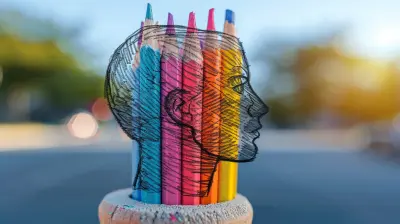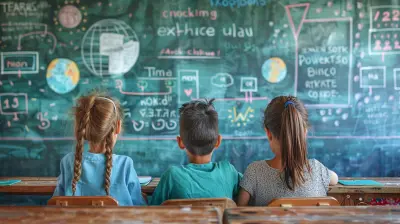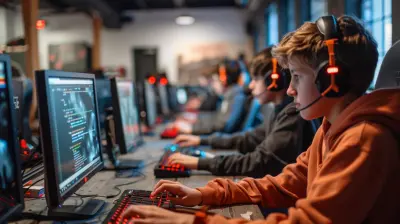25 November 2025
Ever sat in a classroom and felt like the teacher was talking at you, not to you? Don’t worry — you’re not alone. Traditional education often leans heavily on one-way communication. The teacher lectures, and you're expected to take notes, remember everything, and apply it later. But what if I told you that some of the most powerful learning happens when the students start talking to each other? That's where peer learning comes in — and for adult learners, it can be a complete game-changer.
In this article, we’ll break down the key advantages of peer learning in adult education. We'll also look at why it works so well, how it's transforming modern classrooms, and how you can tap into it to boost your own learning.

What Is Peer Learning, Anyway?
Before we dive into the benefits, let’s get clear on what we're talking about.Peer learning is a collaborative approach where learners share knowledge, experiences, and skills with one another. Think group discussions, study circles, team projects, or even simply helping each other understand something tricky.
It’s not about replacing teachers. It’s about adding another layer — a support network of peers you can learn from and with. For adults, who often bring a diverse range of experiences and backgrounds to the table, peer learning can be incredibly rich and effective.

Why Peer Learning Stands Out in Adult Education
1. Adults Bring Life Experience to the Table
Let’s be real — adult learners are not blank slates. They come with years (sometimes decades) of life and work experience. This experience becomes educational gold in a peer learning environment.Imagine learning project management from a textbook versus discussing it with someone who’s been doing it for 10 years. Which one do you think will stick better?
In peer learning, adults don’t just absorb information; they reflect on it, challenge it, and connect it to what they already know. That’s deep learning — and it's a lot more meaningful than rote memorization.
2. It Builds Confidence Through Collaboration
Let’s face it — going back to school as an adult can be intimidating. You might feel rusty, out of place, or even nervous about asking "silly" questions.Peer learning creates a safe, supportive space. Instead of one person having all the answers (i.e., the teacher), everyone contributes. You’re not just a student — you’re also a teacher in some situations. That builds confidence. Suddenly, you're not just learning from your peers; you're helping others learn too. That’s empowering.
3. It Keeps Things Interactive and Engaging
Nobody enjoys sitting through a two-hour lecture wondering when it will end. Peer learning shakes things up.When you get involved in a group project, a problem-solving activity, or a peer review, you're actively engaged. You're not just a passive listener; you're a participant. That interaction not only keeps you more alert but also helps the material sink in better.
Bonus? It’s usually a lot more fun.
4. It Develops Real-Life Skills
Sure, you're learning content — but you're also building skills that are super useful in real life:- Communication
- Teamwork
- Conflict resolution
- Critical thinking
- Giving and receiving feedback
These are the kinds of skills employers are constantly looking for. And they’re often best learned by doing — not by reading about them.
Peer learning puts you in real-world scenarios where you have to interact, explain, question, and collaborate. That’s solid preparation for the workplace.
5. It Encourages Accountability
Let’s be honest: when you know your peers are counting on you, you bring your A-game.In a peer learning setup, your contributions matter. Whether it’s preparing for a group presentation or showing up to study sessions, the desire not to let others down can be a powerful motivator.
This kind of accountability often leads to higher engagement, better attendance, and improved performance overall. It’s like having a built-in support system that nudges you to stay on track.
6. It Breaks Down Cultural and Social Barriers
Adult education tends to attract a beautifully diverse crowd — people from different cultures, professions, and walks of life. Peer learning creates opportunities to connect with others you might not interact with otherwise.These interactions can break down biases, broaden perspectives, and build social understanding. Simply put, you get the chance to step into someone else’s shoes, even if just for a moment. That’s not just educational — it’s transformational.

Real-World Examples of Peer Learning in Action
Let’s look at a few practical scenarios where peer learning is making a massive impact in adult education:Study Circles
Groups of adult learners regularly meet to discuss topics, clarify doubts, and support each other. Everyone contributes, and everyone benefits. These sessions often build lifelong friendships and networks, too.Peer Review Workshops
In writing or design classes, learners swap work and give each other feedback. This builds critical thinking and sharpens editing skills while encouraging open-mindedness.Mentorship Pairing
An experienced student might be paired with a newer one. This buddy system reduces stress and helps build confidence. It’s an easy but powerful way to support new learners.Group Projects
Whether it’s solving a case study or creating a presentation, group tasks force collaboration. You learn how to navigate conflict, compromise, and share the spotlight.
What Makes Peer Learning So Effective?
There’s actually some science behind all of this.Studies have shown that we tend to retain more information when we teach others. It's called the “protégé effect” — teaching helps deepen our understanding and boost our recall.
Also, when you hear multiple perspectives from your peers, you're more likely to question assumptions and rethink how you understand a topic. That critical thinking is a key part of adult learning.
Plus, adult learners are often self-directed. Peer learning supports that by giving them opportunities to take ownership of their education.
How to Make Peer Learning Work for You
Thinking this all sounds great but not sure where to start? Got you covered. Here’s how to make the most of peer learning:Be Open to Sharing
You don’t have to be an expert—just be willing to share your thoughts. Sometimes, your perspective is exactly what someone else needs to hear.Ask Questions
No one expects you to have all the answers. Asking questions not only helps you but also opens the door for deeper discussion.Give Constructive Feedback
When reviewing someone else’s work, focus on being honest, respectful, and helpful. Point out what works as well as areas for improvement.Embrace Different Perspectives
You might not always agree with your peers — and that’s OK. In fact, it’s healthy. Different opinions can stretch your thinking and make your ideas stronger.Stay Committed
Show up. Participate. Your group is only as strong as its members. And besides, the more you put in, the more you get back.Addressing the Common Concerns
Is peer learning perfect? Nope — nothing is. But most of the typical concerns have simple solutions.- Worried about dominant personalities taking over? Set ground rules early on to make sure everyone gets heard.
- Concerned about misinformation? Teachers should still guide and monitor discussions to keep things on track.
- Not feeling confident? Remember, everyone starts somewhere. The goal is progress, not perfection.
The Future of Adult Education Is Collaborative
Let’s not fool ourselves — the world is changing fast. New tech, evolving workplaces, and shifting industries mean adults need to keep learning throughout their lives. But this kind of lifelong learning can’t rely on old-school methods that treat students like empty vessels.Peer learning is adaptive, human, and empowering — exactly what adult learners need. It respects the learner’s experience, builds meaningful connections, and turns education into something that’s not just informative, but transformative.
So whether you’re returning to school, exploring a new career, or just brushing up on skills, make room for peer learning. It might just be the secret sauce that takes your educational journey to the next level.








Roxanne McAleer
This article beautifully highlights the value of peer learning in adult education—promoting collaboration and enhancing understanding. Well done!
January 26, 2026 at 4:04 AM